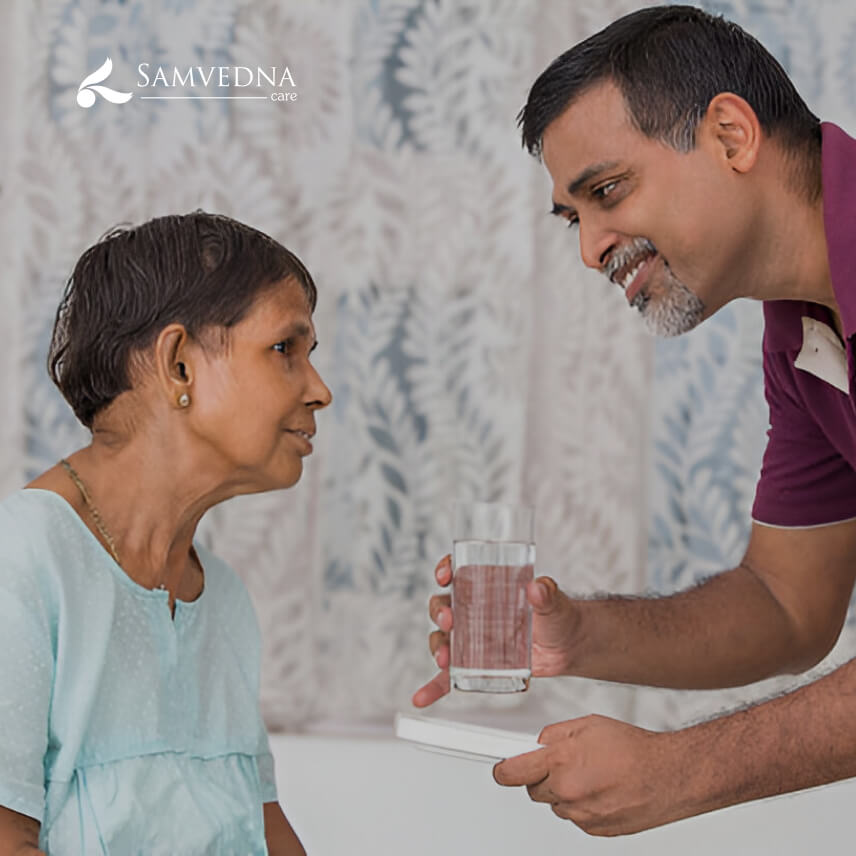Contact Us




When someone is living with dementia, daily life is already challenging, and a stroke makes it even harder for both the individual and their family. However, there is hope. One of the most effective recovery tools is simple yet structured—cognitive exercises.
At Samvedna Care, we understand the emotional and practical challenges that come with a dementia diagnosis, especially when complicated by stroke. That’s why our personalised dementia care services include cognitive stimulation as a key part of recovery and everyday wellbeing. Let’s explore why cognitive exercises are so important for dementia patients after a stroke and how they can make a meaningful difference.
Dementia is a progressive condition that gradually affects memory, language, thinking, and daily functioning. Stroke, on the other hand, is a sudden event that damages part of the brain, often leading to problems with movement, speech, or cognitive abilities.
When a person with dementia experiences a stroke, their condition can suddenly worsen depending on which area of the brain is affected. After a stroke, the brain attempts to heal itself through a process called neuroplasticity—the brain’s ability to form new connections between nerve cells. While recovery may be slower in individuals with dementia, regular cognitive stimulation therapy helps strengthen these connections, allowing the brain to relearn or adjust.
Cognitive decline is an inevitable part of dementia, and a stroke may accelerate this process. Engaging in regular cognitive tasks helps slow down mental deterioration, allowing patients to maintain their abilities for longer. Even simple activities like counting, naming colours, or recalling words can help preserve brain function.
Both dementia and stroke can impair speech and language. Patients may struggle to find words or follow conversations. Cognitive exercises such as naming fruits, describing pictures, or identifying objects support language recall and comprehension—helping patients communicate more effectively and maintain emotional connections.
After a stroke, particularly in older adults with dementia, the ability to concentrate often diminishes. Cognitive exercises like sorting shapes or counting forwards and backwards can improve attention span and mental engagement.
One of the most powerful benefits of cognitive activities is their ability to spark joy and connection. A patient who may seem withdrawn can smile, talk, or show interest when given familiar and achievable tasks. Activities such as music, coloring, recalling past memories, or identifying family members in photos often reduce anxiety, improve mood, and create opportunities for bonding.
Even simple tasks such as following steps in order, remembering a short list, or matching objects can help dementia patients remain more independent in daily life. While cognitive exercises cannot reverse dementia or stroke damage, they enable patients to make the most of their existing abilities and stay actively involved in their care.
At Samvedna Care, we provide personalised dementia care services tailored to each individual’s stage of dementia, medical history, and recovery needs. Our trained specialists and therapists design cognitive exercises and activities based on:
We know that each day is different, which is why our approach is flexible, compassionate, and designed to support both the patient and their caregivers.
Cognitive exercises are not a cure, but they are a powerful tool in helping people with dementia and stroke live with greater dignity, engagement, and joy. Whether it’s remembering a word, solving a puzzle, or naming a colour, every activity helps keep the brain active and connected.
If your loved one has received a dementia diagnosis and is recovering from a stroke, structured cognitive exercises—combined with the right care and caregiver support—can significantly improve their quality of life.
At Samvedna Care, we specialise in dementia care services that focus on recovery, emotional wellbeing, and caregiver support. Contact us today to learn how we can help your loved one live more meaningfully.